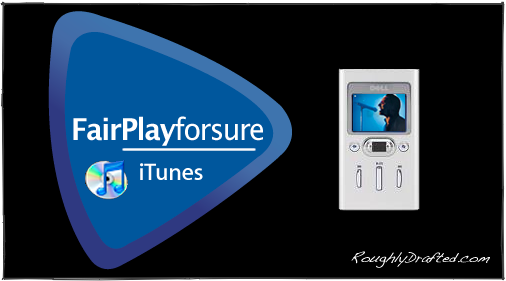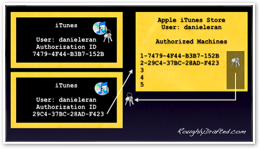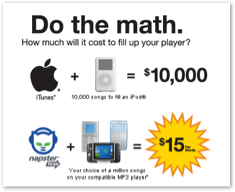

Readers Write about FairPlay Licensing and DRM
Responding to How FairPlay Works: Apple's iTunes DRM Dilemma works and Will Steve Jobs License Apples FairPlay DRM? several readers questioned the difficulty of adding non-DRM songs to iTunes, the sincerity of comments made by Steve Jobs, and how DRM music has related to the success of the iPod.
Couldn't Apple Engineer a Way to Sell Non-DRM Songs?
How FairPlay Works stated: Offering DRM-free tracks next to protected songs in the iTunes Store would require significant changes to how iTunes works, and could inadvertently open up new exploits to the remaining DRM system, complicating the system further.
One reader asked, "On what grounds can you claim that it would require 'significant change?' After all if a Linux application was able to download AAC tracks off iTunes without putting the DRM on it, surely Apple could organise it for iTunes' next version? It would only require a kill switch: 'don't DRM this file.' What evidence do you have that contradicts this logic?"

The answer really involves two questions. The first is: could Apple figure out how to add non-DRM sales to iTunes? That has an easy answer: yes.
Getting DRM out of iTunes
A new version of iTunes would be required to support non-DRM, AAC song purchases, if Apple wanted DRM-free purchases to behave like other purchased content.
Developing and deploying a new release would involve significant change and effort on Apple part, regardless of how technically complex the problem was.
DVDJon suggested this would only take Apple "two or three days of effort," but as reader Matt Craig points out, that estimate is simply unrealistic.
An open source developer might likely be able to hammer out a rough draft of an iTunes client that accommodated DRM-free sales, but iTunes Store customers demand a level of support and polish that most open source developers wouldn't want to provide.
Hey Aren't iTunes Podcasts Already Free?
Another reader wrote: "Something doesn't make sense here. You mention that Apple offers unprotected podcasts through iTunes, but then turn around and say that offering unprotected music tracks would create difficult engineering challenges. That doesn't make sense--the engineering has already been done to allow unprotected podcasts; I would think it would be trivial to repurpose it for unprotected tracks."
Podcasts in iTunes are downloaded directly from outside servers, not from Apple. The podcast support in iTunes involves Apple listing and organizing only the RSS feeds of publishers who serve up their own files to anyone who subscribes to them. 

Further, all iTunes podcasts are free, so there's no sales transaction happening; podcasts are wholly unrelated to the DRM and encryption mechanisms used to deliver purchased content from the iTunes Store.
The iTunes Store does already offer PDF files that can be downloaded for purchase or with purchases, and there is no DRM applied to them.
Apple could easily sell or offer MP3 files in the same way, even without updating iTunes. However, those files wouldn't behave like other song purchases, wouldn't "sync purchases" with iPods, and generally would serve only to frustrate and annoy customers.
The Slippery Slope
Another thing to consider: if Apple did rework iTunes to sell AAC songs without DRM protection, what would prevent the "conversation" from simply shifting to "why isn't Apple selling MP3s or Og Vorbis files instead?"
How many people could play unprotected AAC songs on their player of choice? How many would complain that they needed to re-encode the DRM-free AAC songs anyway, subsequently incurring the same potential for loss as they already enjoy when burning a CD and ripping it?
Of course, its not technically impossible to encode the entire iTunes library into MP3, Og Vorbis, and several other formats, but doing so would serve a small population, and one that isn't really big on paying for content anyway.
It certainly isn't hard to fathom why Apple doesn't jump every time the Internet suggests an idea; there's a lot of ideas, and many are just plain bad.
Engineering a Solution that Doesn't Solve the Problem: Priceless
The second big question is: would any amount of work to add DRM-free purchases to iTunes actually solve any existing problems? For Apple, no.
Apple's problem of having to manage and police FairPlay isn't solved by adding a few non-DRM songs to sell in the iTunes Store. Apple wants to get rid of DRM on music sales, citing the fact that most music is sold unprotected on CD anyway, no impress us with a show of offering a few MP3s for sale like Yahoo!
The only problem addressed by adding non-DRM songs to iTunes is the availability of Barenaked Ladies and other acts who would like the idea of being able to sell their work without DRM.
There are several sources of MP3 downloads already. Some are free, some are for sale. If Apple did jump into MP3 sales, it would only step on smaller stores who make their livelihood selling songs in the MP3 format.
Stores exclusively selling MP3s currently offer buyers an alternative to Apple's FairPlay DRM music in iTunes. If Apple started selling their same content, just to have some "non-DRM" content to sell, it could only possibly result in more monoculture, and fewer options for buyers.
That would be just as bad as if Apple entered vinyl sales to destroy the market for small record stores. What purpose would that serve?
News Flash: Steve Jobs Wasn't Ever a Fan of DRM
Several people have called Jobs' remarks about being willing to give up DRM as disingenuous, just like Bill Gates' saccharine song to bloggers.
However, long before it was fashionable to criticize DRM, back in the days that every columnist was gushing about how Microsoft would usher in a brave new worlds of content with the DRM in Windows Media and Palladium PCs, back in the days when the iTunes Store had just barely opened, Jobs was interviewed in Rolling Stone.
How did the the record companies react when you initially approached them about getting on-board with Apple?
"Well, there's a lot of smart people at the music companies. The problem is, they're not technology people. The good music companies do an amazing thing. They have people who can pick the person that's gonna be successful out of 5,000 candidates. And there's not enough information to do that -- it's an intuitive process. And the best music companies know how to do that with a reasonably high success rate.
"I think that's a good thing. The world needs more smart editorial these days. The problem is, is that that has nothing to do with technology. And so when the Internet came along, and Napster came along, they didn't know what to make of it. A lot of these folks didn't use computers -- weren't on e-mail; didn't really know what Napster was for a few years. They were pretty doggone slow to react. Matter of fact, they still haven't really reacted, in many ways. And so they're fairly vulnerable to people telling them technical solutions will work, when they won't.
Because of their technological ignorance.
"Because of their technological innocence, I would say. When we first went to talk to these record companies -- you know, it was a while ago. It took us 18 months. And at first we said: None of this technology that you're talking about's gonna work. We have Ph.D.'s here, that know the stuff cold, and we don't believe it's possible to protect digital content.
[...] “What's new is this amazingly efficient distribution system for stolen property called the Internet -- and no one's gonna shut down the Internet. And it only takes one stolen copy to be on the Internet. And the way we expressed it to them is: Pick one lock -- open every door. It only takes one person to pick a lock. Worst case: Somebody just takes the analog outputs of their CD player and rerecords it -- puts it on the Internet. You'll never stop that. So what you have to do is compete with it."
"At first, they kicked us out. But we kept going back again and again. The first record company to really understand this stuff was Warner. They have some smart people there, and they said: We agree with you. And next was Universal. Then we started making headway. And the reason we did, I think, is because we made predictions.
"We said: These [music subscription] services that are out there now are going to fail. Music Net's gonna fail, Press Play's gonna fail. Here's why: People don't want to buy their music as a subscription. They bought 45's; then they bought LP's; then they bought cassettes; then they bought 8-tracks; then they bought CD's. They're going to want to buy downloads. People want to own their music. You don't want to rent your music -- and then, one day, if you stop paying, all your music goes away."

Yes, Steve Jobs announced the death of subscription sales and the futility of bulletproof DRM long before it was the hot-to-trot buzzchat that even CNET writers knew how to throw around for populist pandering.
Even more illuminating: Microsoft still hasn't figured discovered this. Bill Gates still thinks DRM needs to be “fixed,” so that subscriptions can be forced down consumers throats as the only available option.
The Ever Imminent iPod Killer
Another reader wrote: "Apple has to be terrified that the iPod can not compete long term in a wide open market. Look at every other company that once had the 'it-product.' Without DRM the iPod will go the way of the Walkman, or the Walkman-CD, or the Palm Pilot, or the iMac or so many other great products that couldn't both defend market share while disrupting the market with new innovation.
"Apple has the lead now, but there are a lot of hungry wolves on their trail (Sony, Microsoft, and others). As CD's decline and the bulk of music sales move online a lot of companies stand to lose a lot of revenue. Why wouldn't Apple do everything you can to protect that lead?"
That view assumes that the iPod is protected by iTunes sales. However, we actually know that iPods are full of songs ripped from CDs, not tracks purchased from the iTunes Store.
 Napster's ads once fancifully stated that it would cost "$10,000 to fill an iPod," based on 99 cents times the song capacity of the iPod. It is safe to say that few have dropped thousands of dollars buying iTunes songs.
Napster's ads once fancifully stated that it would cost "$10,000 to fill an iPod," based on 99 cents times the song capacity of the iPod. It is safe to say that few have dropped thousands of dollars buying iTunes songs. People didn't buy iPods to use their iTunes music, either. A lot of us bought iPods before there was an iTunes Store, and plenty of people with iPods can’t even use the iTunes Store, because the music labels have held up licensing for a store in their country.
People buy iPods because they are better than other competing players in areas that matter, including simplicity. The iPod has survived the onslaught of Walkman players from Sony, PlaysForSure devices from Creative, SanDisk, and Samsung, and didn't even flinch when Microsoft launched the aweful Zundenburg.
Have Sony, Microsoft, and others not been "hungry" before? How many iPod Killers have been announced since 2004? That was three years ago! Apple's share has grown, not shrunk.
The alternatives are not constrained by incompatibility with iTunes, but rather are lessor products that deserved to fail. All of them sported far worse DRM anyway, apart from the curiously included Palm, which failed due to egregious incompetence, and the iMac, which has gained market share, not lost it.
Reverse Licensing: Good Idea, or Absolutely Bonkers?
Another reader suggested Apple’s fight with Real was inappropriate. "Apple actively makes it impossible to play any other DRM tracks on their players. Regardless of whether or not it's a good idea to license FairPlay, Apple could have, at the very least, enabled PlaysForSure use on the iPod, therefore releasing their monopoly chokehold on the iPod+iTunes marriage.”
“But if they did that, they wouldn't have as many people purchasing tracks on iTunes. While the profits from iTunes may be negligible for Apple, I can just about guarantee you that it's a driving force behind why Apple refuses to support the more widely accepted protected WMA format on the iPod."
Apple created the iTunes Store to make sure there would be music for the iPod and the Mac. If Apple licensed rivals’ DRM, it would undermine the whole point of iTunes. If the world had gone with DRM from Real and Microsoft (and Sony), purchased music wouldn't play on the Mac and wouldn't support QuickTime.
 Further, users would be more restricted, not less. Their music could expire, refuse to burn to CDs, and would become increasingly more expensive as Microsoft paid off the labels for "piracy indulgence fees," and encouraged them to raise prices to see just how high they could go. Microsoft has done the same with its own software, pricing its Vista upgrades through the roof.
Further, users would be more restricted, not less. Their music could expire, refuse to burn to CDs, and would become increasingly more expensive as Microsoft paid off the labels for "piracy indulgence fees," and encouraged them to raise prices to see just how high they could go. Microsoft has done the same with its own software, pricing its Vista upgrades through the roof."Apple has created a nice little bubble for themselves, and I guess they've found the loopholes to avoid antitrust lawsuits over the blatant fact that iTunes+iPod is an exclusive partnership...which certainly sounds unethical."
Is it "unethical" to make a service that works with your own product? Like the Xbox Live service? Or Sony's PlayStation or Nintendo's Wii online services?
Beyond the fact that it's simply absurd to suggest that iTunes and the iPod involve some sort of anti-trust situation, anyone can dump out songs they buy from iTunes onto a CD. Try to do that with the online games, and play them on another console.
I guarantee that you'll lose more in the transition than some possible loss in sound quality.
Like reading RoughlyDrafted? Share articles with your friends, link from your blog, and subscribe to my podcast!
Did I miss any details?
Next Articles:
This Series


 |
|
 |
|
 Del.icio.us |
Del.icio.us |
 Technorati |
About RDM |
Forum : Feed |
Technorati |
About RDM |
Forum : Feed |

Thursday, March 1, 2007





 Send Link
Send Link Reddit
Reddit Slashdot
Slashdot NewsTrust
NewsTrust





